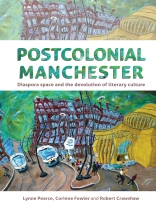Postcolonial Manchester offers a radical new perspective on Britain’s devolved literary cultures by focusing on Manchester’s vibrant, multicultural literary scene. Referencing Avtar Brah’s concept of ‘diaspora space’, the authors argue that Manchester is, and always has been, a quintessentially migrant city to which workers of all nationalities and cultures have been drawn since its origins in the cotton trade and the expansion of the British Empire. This colonial legacy – and the inequalities upon which it turns – is a recurrent motif in the texts and poetry performances of the contemporary Mancunian writers featured here, many of them members of the city’s long-established African, African-Caribbean, Asian, Chinese, Irish and Jewish diasporic communities. By turning the spotlight on Manchester’s rich, yet under-represented, literary tradition in this way, Postcolonial Manchester also argues for the devolution of the canon of English Literature and, in particular, recognition for contemporary black and Asian literary culture outside of London.
Cuprins
Introduction: Manchester and the devolution of British literary culture – Corinne Fowler and Lynne Pearce
1. Manchester: the postcolonial city – Lynne Pearce
2. Publishing Manchester’s black and Asian writers – Corinne Fowler
3. Manchester’s crime fiction: the mystery of the city’s smoking gun – Lynne Pearce
4. Collective resistance: Manchester’s mixed-genre anthologies and short-story collections – Lynne Pearce
5. Rebels without applause: Manchester’s poetry in performance (1960s – the present) – Corinne Fowler
6. Giving Voice: the writers’ perspective – Robert Crawshaw
Afterword
Index
Despre autor
Lynne Pearce is Professor of Literary Theory at Lancaster University












